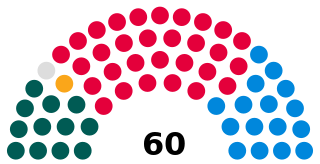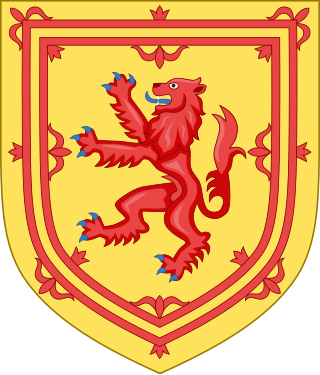Related Research Articles

The Legion of Merit (LOM) is a military award of the United States Armed Forces that is given for exceptionally meritorious conduct in the performance of outstanding services and achievements. The decoration is issued to members of the eight uniformed services of the United States as well as to military and political figures of foreign governments.

The United Kingdom is a unitary state with devolution that is governed within the framework of a parliamentary democracy under a constitutional monarchy in which the monarch, currently Charles III, is the head of state while the Prime Minister of the United Kingdom, Rishi Sunak, is the head of government. Executive power is exercised by the British government, on behalf of and by the consent of the monarch, and the devolved governments of Scotland, Wales and Northern Ireland. Legislative power is vested in the two chambers of the Parliament of the United Kingdom, the House of Commons and the House of Lords, as well as in the Scottish, Northern Irish and Welsh parliaments.

The Senedd, officially known as the Welsh Parliament in English and Senedd Cymru in Welsh, is the devolved, unicameral legislature of Wales. A democratically elected body, it makes laws for Wales, agrees certain taxes and scrutinises the Welsh Government. It is a bilingual institution, with both Welsh and English being the official languages of its business. From its creation in May 1999 until May 2020, the Senedd was known as the National Assembly for Wales.

The politics of Scotland operate within the constitution of the United Kingdom, of which Scotland is a constituent country. Scotland is a democracy, being represented in both the Scottish Parliament and the Parliament of the United Kingdom since the Scotland Act 1998. Most executive power is exercised by the Scottish Government, led by the First Minister of Scotland, the head of government in a multi-party system. The judiciary of Scotland, dealing with Scots law, is independent of the legislature and the executive. Scots law is primarily determined by the Scottish Parliament. The Scottish Government shares some executive powers with the Government of the United Kingdom's Scotland Office, a British government department led by the Secretary of State for Scotland.

The Marine, &c., Broadcasting (Offences) Act 1967, shortened to Marine Broadcasting Offences Act or "Marine offences Act", became law in the United Kingdom at midnight on Monday 14 August 1967. It was subsequently amended by the Wireless Telegraphy Act 2006 and the Broadcasting Act 1990. Its purpose was to extend the powers of the Wireless Telegraphy Act 1949, beyond the territorial land area and territorial waters of the UK to cover airspace and external bodies of water.

The Individual Ready Reserve (IRR) is a category of the Ready Reserve of the Reserve Component of the Armed Forces of the United States composed of former active duty or reserve military personnel. Its governing statute is codified at 10 U.S.C. § 10144. For soldiers in the National Guard of the United States, its counterpart is the Inactive National Guard (ING). As of 22 June 2004, the IRR had approximately 112,000 members composed of enlisted personnel and officers, with more than 200 Military Occupational Specialties are represented, including combat arms, combat support, and combat service support.

The fishing industry in Scotland comprises a significant proportion of the United Kingdom fishing industry. A recent inquiry by the Royal Society of Edinburgh found fishing to be of much greater social, economic and cultural importance to Scotland than it is relative to the rest of the UK. Scotland has just 8.4 per cent of the UK population but lands at its ports over 60 per cent of the total catch in the UK.

The Equality Act 2010 is an Act of Parliament of the United Kingdom passed during the Brown ministry with the primary purpose of consolidating, updating and supplementing the numerous prior Acts and Regulations, that formed the basis of anti-discrimination law in mostly England, Scotland and Wales; some sections also apply to Northern Ireland. These consisted, primarily, of the Equal Pay Act 1970, the Sex Discrimination Act 1975, the Race Relations Act 1976, the Disability Discrimination Act 1995 and three major statutory instruments protecting discrimination in employment on grounds of religion or belief, sexual orientation and age.

The Government of Nepal is the federal executive authority of Nepal. Prior to the abolition of the Nepali monarchy in 2006, it was officially known as His Majesty's Government.
European labour law regulates basic transnational standards of employment and partnership at work in the European Union and countries adhering to the European Convention on Human Rights. In setting regulatory floors to competition for job-creating investment within the Union, and in promoting a degree of employee consultation in the workplace, European labour law is viewed as a pillar of the "European social model". Despite wide variation in employment protection and related welfare provision between member states, a contrast is typically drawn with conditions in the United States.

The constitution of the United Kingdom or British constitution comprises the written and unwritten arrangements that establish the United Kingdom of Great Britain and Northern Ireland as a political body. Unlike in most countries, no attempt has been made to codify such arrangements into a single document, thus it is known as an uncodified constitution. This enables the constitution to be easily changed as no provisions are formally entrenched; the Supreme Court of the United Kingdom recognises that there are constitutional principles, including parliamentary sovereignty, the rule of law, democracy, and upholding international law.

An officer is a person who holds a position of authority as a member of an armed force or uniformed service.

There have been women in the United States Marine Corps since 1918, and women continue to serve in the Corps today. As of 2020, women make up 8.9% of total active duty Marines. The Marine Corps has the lowest percent of female service members of all of the U.S military branches. Women's presence in the Marine Corps first emerged in 1918 when they were permitted to do administrative work in an attempt to fill the spots of male Marines fighting overseas. It was not until 1948 that women were able to become a permanent part of the Corps with the passing of the Women's Armed Services Integration Act. However, even with the Integration Act, women were still banned from certain military occupation specialties. It was not until 2016 that Defense Secretary Ash Carter announced that all military occupations would be open to women without exception. As of 2018, there were 18 women serving in the Marine Corps combat arms. In December 2020, the Marine Corps Recruit Depot San Diego agreed to join the Marine Corps Recruit Depot Parris Island in accepting female recruits, with 60 female recruits starting their boot camp training at the San Diego depot in February 2021. 53 of these recruits would successfully graduate from boot camp in April 2021 and become Marines.

Antonia Louise Antoniazzi is a Welsh Labour Party politician. She was elected as the Member of Parliament (MP) for Gower at the 2017 general election.

The Uba riots of 1937 or simply the Mauritian riots of 1937 refers to an outbreak of riots and civil disturbances that broke out amongst small scale sugar cane growers on the island of Mauritius in August 1937. The riots led to the death of 4 people with an additional 6 people being injured.

Local elections in the United Kingdom took place on 5 May 2022. These included elections for all London borough councils, for all local authorities in Wales and Scotland. Most seats in England were last up for election in 2018 and in Scotland and Wales in 2017. The elections coincided with the 2022 Northern Ireland Assembly election. In 91 cases, most of them in Wales, council seats were uncontested, each having only one candidate. Three seats in Scotland remained unfilled as no one nominated to fill them.

The 2022 Bromley London Borough Council election took place on 5 May 2022. All 58 members of Bromley London Borough Council were elected. The elections took place alongside local elections in the other London boroughs and elections to local authorities across the United Kingdom.

The 2022 Greenwich London Borough Council election took place on 5 May 2022. All 55 members of Greenwich London Borough Council will be elected. The elections will take place alongside local elections in the other London boroughs and elections to local authorities across the United Kingdom.

The 2022 Hammersmith and Fulham London Borough Council election took place on 5 May 2022. All 50 members of Hammersmith and Fulham London Borough Council were elected. The elections took place alongside local elections in the other London boroughs and elections to local authorities across the United Kingdom.